News

ICA preconference #JODS
video registration JUSTICE AND ORDER IN THE DATAFIED SOCIETY: CONNECTING COMMUNICATIONS AND LEGAL THEORY Preconference for ICA 2019, Washington DC, Friday May 24, 2019 held at the University of Washington School of Law Organized by: Nick Couldry (London School of Economics), Lina Dencik (Cardiff University), Karin van Es (Data School), and Andreas Hepp (University of…
Read more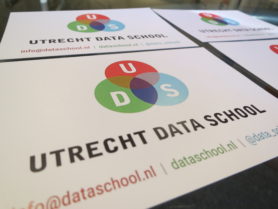
“There is a political and ethical component to data.”
“Data and algorithms offer many possibilities, but they are not neutral. What you analyse, which algorithms you build, the data you use and what for, these are political and ethical choices. Policy makers are insufficiently aware of this. Furthermore, basic knowledge of data literacy is absolutely necessary for local politicians.” That’s what the Dutch data…
Read more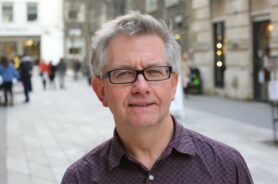
Datafication and Colonialism: A Short Review by Dennis Jansen
Review of “The Emerging Social Order of Data Colonialism: Why Critical Social Theory still Matters!” by prof. dr. Nick Couldry at Utrecht University, 12 June 2019 It is undeniable that the increasing datafication of both Western and non-Western societies involves profound changes in our political and socioeconomic structures, but how should we understand those changes?…
Read more
Watch lecture Nick Couldry: The Emerging Social Order of Data Colonialism
On 12 June the Datafied Society and the Centre for Humanities hosted the lecture The Emerging Social Order of Data Colonialism: Why Critical Social Theory Still Matters! with Prof. Nick Couldry (London School of Economics and Political Science). The event was moderated by Prof. José van Dijck. Repondents were Prof. mr. Janneke Gerards, Dr Koen…
Read more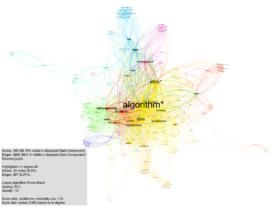
Doing a systematic review/meta analysis on fuzzy phenomena
Maranke Wieringa (d.d. 4 June 2019) Meta analyses or systematic literature reviews are taken to be the golden standard for assessing the collective knowledge on a particular topic. While frequently employed within the social and natural sciences, they are hard to put into practice in the Humanities, which do not often have strictly controlled experiments…
Read more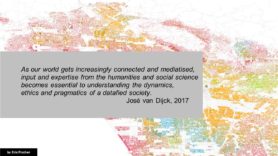
Governing the Digital Society is a new focus area at Utrecht University
One of the four newly identified focus areas at Utrecht University is Governing the Digital Society. Focus areas interdisciplinarily address research objects of societal relevance and develop novel ways of scientific inquiry. The four new focus areas will receive a total of 1,6 million Euro funding for the period September 2019 to August 2023. Big…
Read more
Governing the Digital Society is a new focus area at Utrecht University
One of the four newly identified focus areas at Utrecht University is Governing the Digital Society. Focus areas interdisciplinarily address research objects of societal relevance and develop novel ways of scientific inquiry. The four new focus areas will receive a total of 1,6 million Euro funding for the period September 2019 to August 2023. Big…
Read more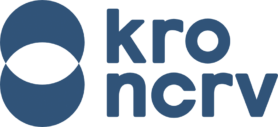
Meet interns Rosemarij & Kirsten #projectkroncrv
We are Rosemarij Zeeman and Kirsten Leufkens, and both of us started the master’ s programme New Media and Digital Culture this year. Rosemarij with a background in communication and information sciences and Kirsten in interdisciplinary social sciences. This makes for a great and interesting collaboration, in which we can use our knowledge to complement…
Read more
Meet intern Melissa #gabproject
My name is Melissa Blekkenhorst. After finishing the Bachelor Media & Culture, I started the Master New Media & Digital Culture. As an intern of the Data School, I am joining the Gab project. This project focuses on the fringe platform Gab, which is a Twitter alternative that advocates free speech and has become popular…
Read more
Meet intern Ruud #projectkroncrv
My name is Ruud Dielen, intern at Data School and student of the master New Media & Digital Culture at Utrecht University. After a bachelor in Media & Culture, with a focus on television, game and new media studies, I applied for the internship position at the research project commissioned by the KRO-NCRV. Within our…
Read more
